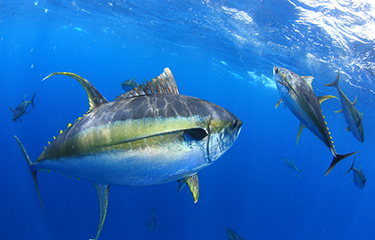Pressure builds for IOTC ahead of special session, with several groups calling for urgent action

Many seafood supply chain players and industry stakeholders are calling on the Indian Ocean Tuna Commission (IOTC) for reforms as concerns surrounding heavy fishing in the region reach a boiling point in advance of the commission’s next meeting, set to run from 8 to 12 March, 2021.
The Global Tuna Alliance, the Tuna Protection Alliance, and several seafood companies are urging the inter-governmental organization – which is responsible for the management of Indian Ocean tuna fisheries – to impose an overall 20 percent cut in regional yellowfin tuna catch compared to 2014 levels.
In a letter to the IOTC, the organizations and companies argued that overfishing is jeopardizing the future of Indian Ocean yellowfin tuna, which generates USD 4 billion (EUR 3.3 billion) each year. The IOTC’s current rebuilding plan for the overfished stocks is ineffective, according to the letter-writers, who cited two reasons why the issue should be addressed during the commission’s special session.
Firstly, “the current measure is interim and therefore must be renewed or revised this year,” they said. Additionally, “the existing measure did not provide for catch reductions that aligned with management advice from the science committee to rebuild the stock to a sustainable level.”
“Moreover, poor compliance with the measure further undermined the effectiveness of the measure to achieve the rebuilding objective,” the letter stated.
The signatories of the letter said they believe the most-effective way to reach an agreement at the meeting is for an IOTC contracting and cooperating non-contracting party (CPC) to present a draft resolution that specifies how the yellowfin stock could be rebuilt in two generations. Catch reductions that are proportionate and equitable between gear-types is the desired aim, according to the letter, which asked the IOTC to find consensus among different parties and to strengthen sanctions for noncompliance.
The Organization of Associated Producers of Large Freezer Tuna Vessels (OPAGAC) and the Spanish tuna fleet, meanwhile, have also raised concerns with the IOTC, specifically regarding its intentions to assign yellowfin tuna quotas to fleets that fish with driftnets – a gear-type prohibited by the commission in 2012 due to high bycatch rates of threatened and protected species such as sharks, marine mammals, and turtles.
OPAGAC – a Spain-based association of nine operators of 47 tuna purse-seiners fishing in the Atlantic, Indian, and Pacific oceans – said it’s critical of the IOTC’s proposal to include driftnets, as well as the countries that stand to benefit from the measure – such as Iran, Indonesia, India, Sri Lanka, Pakistan, and Oman. These countries operate fisheries that are “insufficiently controlled by their national authorities,” OPAGAC said.
“In most cases, they fail to meet other IOTC requirements, too, like the use of satellite tracking systems, vessel authorization, minimum levels of coverage under observer programs, and port sampling,” the organization said.
The Spanish fleet pointed to Iran as an especially egregious example.
“Iran has doubled its catch volume despite being subject to a limit under the Indian Ocean yellowfin tuna recovery plan,” it said. “In addition, Iran has the highest cetacean bycatch of any country, about 30,000 cetaceans a year, and it is the IOTC’s greatest debtor, owing 46 percent of the organization’s outstanding funds. For all these reasons, OPAGAC considers it outrageous for the Iranian fleet to be given catch possibilities in the new proposals aimed at facilitating the yellowfin tuna population’s recovery.”
In step with the signatories of the Global Tuna Alliance-led letter, OPAGAC also said it would like to see better enforcement of penalties for noncompliance.
A group of more than 100 conservation organizations, civil society groups, artisanal fisher associations, and responsible businesses is pushing the IOTC to add another critical issue to its upcoming docket: addressing the harmful environmental impacts associated with drifting fish-aggregating devices (FADs) used by industrial tuna purse-seiners in the region.
In a separate letter to the commission, the group asked the IOTC to adopt the conservation and management measure (CMM) proposal previously submitted by Kenya and Sri Lanka.
“Signatories of this letter recognize the urgent need to improve drifting-FAD management in the Indian Ocean and consider this proposal to be both timely and suitable for this purpose. Successful implementation of this proposal will help facilitate rebuilding of the Indian Ocean yellowfin tuna stock, primarily by reducing catches of juvenile tropical tunas, but also by more broadly enabling sustainable management of industrial purse-seine fleets operations within the Indian Ocean,” the letter stated.
Adopting the proposal “would also help mitigate other ecological impacts associated with drifting-FADs, including those on turtles, sharks, and marine mammals, which are affected as direct bycatches, and through entanglement mortality with continued ghost fishing when drifting-FADs are lost, discarded, or abandoned,” according to the letter.
The group said coral reefs and other inshore habitats would benefit if the IOTC implemented the CMM proposal.
“The damage to coral reefs and other sensitive inshore habitats when drifting FADs become stranded, as well as the contribution of drifting-FADs to marine debris and marine plastic pollution, could also be mitigated through implementation of this proposal,” the letter stated.
Photo courtesy of Al McGlashan/Shutterstock






Share